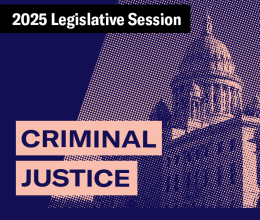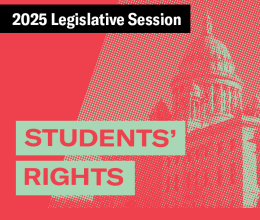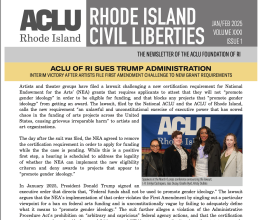The American Civil Liberties Union of Rhode Island today issued a report calling on state and municipal leaders to examine policies, practices and procedures that lead to discriminatory treatment of black Rhode Islanders, from elementary school through adulthood. The ACLU report, titled “The School-to-Prison Pipeline in Black and White,” offers a brief but systematic examination of racial disparities in Rhode Island, and how those interconnected disparities can lead to a lifetime of unequal treatment. The report, presented in a series of twelve charts, comes as the nation celebrates Black History Month, and grapples with recent events that have pushed racial disparity issues back into the forefront.
Data has long shown that black Rhode Islanders are disproportionally suspended from school, stopped and searched by police, arrested, and incarcerated. When this data is compiled, as it is in today’s report, it becomes clear that the disproportionate singling out, scrutinizing, and punishing of black Rhode Islanders is a persistent and far-reaching problem and one that contributes to the school-to-prison pipeline, a systematic pattern of pushing students, especially minorities, out of the classroom and into the criminal justice system.
As adults, black Rhode Islanders are disproportionately stopped and searched by police, exacerbating disparities in arrest rates even when black and white individuals commit infractions at roughly the same rate. The end result of these racial disparities is a prison population that is disproportionately black. This racial disparity leaves the black community to bear the brunt of the socioeconomic consequences that follow incarceration, including lack of employment and denial of housing, perpetuating the cycle of unequal treatment.
“Despite this growing body of evidence and consistent work by many to address these disparities, Rhode Island has lacked a comprehensive, strong response to resolve these issues. Worse, even as these disparities persist in the background, too many people still refuse to acknowledge their presence and the damaging effects that flow from them,” the report stated.
The ACLU urged the state and local leaders, particularly law enforcement agencies and school districts, to help stop the school-to-prison pipeline by regularly examining racial impact of their policies and procedures and developing plans to reduce any racial disparities. The ACLU also continues to support strong, comprehensive racial profiling legislation and legislation limiting the use of out-of-school suspensions.
ACLU of RI policy associate Hillary Davis said today: “This report demonstrates what many have known for a long time: life in Rhode Island is different, depending on your skin color. It is our hope that the state's leaders will come together to address the problem of racial disparities in Rhode Island before a larger crisis occurs.”





